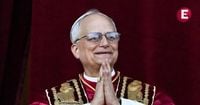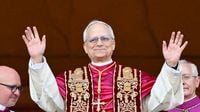On May 8, 2025, the Catholic Church made history by electing Robert Francis Prevost as Pope León XIV, marking a significant milestone as he becomes the first pontiff from the United States. His election reflects not only the increasing diversity within the Church but also the global nature of its leadership.
The conclave, which took place in the Sistine Chapel, was the most international in history, featuring representatives from 70 countries. The election was confirmed by the emergence of white smoke from the chimney at 18:07 local time, signaling that at least two-thirds of the 133 voting cardinals had reached a consensus. The bells of St. Peter's Basilica rang out in celebration as the news spread, filling the square with jubilant crowds eager to witness the announcement.
Cardinal Dominique Mamberti, the protodeacon, stepped out onto the balcony of St. Peter's Basilica to declare, "Annuntio vobis gaudium magnum; habemus Papam: Eminentissimum ac Reverendissimum Dominum, Dominum Robertum Sanctæ Romanæ Ecclesiæ Cardinalem Prevost, qui sibi nomen imposuit Leonem XIV." This translates to, "I announce to you a great joy: we have a Pope! The most eminent and reverend Lord, Lord Robert, Cardinal of the Holy Roman Church Prevost, who has taken the name León XIV."
Born on September 14, 1955, in Chicago, Illinois, Prevost comes from a diverse background, with French, Italian, and Spanish roots. He entered the minor seminary of the Order of San Agustín in 1973 and later obtained a bachelor's degree in Mathematics from Villanova University in 1977. Prevost then pursued theological studies at the Catholic Theological Union in Chicago, graduating with a diploma in theology. His academic journey continued in Rome, where he earned both a licentiate and a doctorate in Canon Law from the Pontifical University Santo Tomás de Aquino in 1984 and 1987, respectively.
Prevost's missionary work began in 1985 when he was sent to Peru. He held various roles during his tenure, including parish priest, diocesan official, and seminary professor. From 1988 to 1998, he directed the Augustinian seminary in Trujillo and taught Canon Law at the diocesan seminary. His dedication to the region led him to acquire Peruvian nationality in 2015, solidifying his bond with the Andean nation.
In 1998, Prevost was elected provincial prior of the Augustinian province of Our Lady of Good Counsel in Chicago. He was later elected prior general of the Order of San Agustín, serving two consecutive terms until 2013. His leadership was recognized for effectively managing a religious order with a presence across multiple countries and cultural contexts.
In 2014, Pope Francisco appointed him as the apostolic administrator of the diocese of Chiclayo in Peru, where he was consecrated bishop on December 12, 2014. A year later, he became the bishop of Chiclayo, a position he held until 2023. During this time, he also served as the apostolic administrator of the diocese of Callao from 2020 to 2021. His close relationship with the Church in Peru and his leadership roles culminated in his appointment as prefect of the Dicastery for Bishops and president of the Pontifical Commission for Latin America in January 2023.
Prevost's election as Pope signifies a continuity with the pastoral approach of his predecessor, Pope Francisco, emphasizing closeness to the people. He has advocated for a clergy that is "cercano al pueblo" (close to the people), contrasting sharply with the image of a distant administrator. His commitment to transparency and support for abuse victims has been a significant part of his ministry.
At 69 years old, Prevost is regarded as a relatively young pontiff, and his election is seen as a bridge between the conservative and reformist factions within the Church. His extensive knowledge of Latin American realities has garnered him support from both northern and southern cardinals, many of whom have been critical of Pope Francisco in the past.
Prevost is fluent in English, Spanish, Italian, and French, allowing him to engage effectively in multicultural and multilingual contexts. His episcopal motto, "In illo uno unum" (In that one, one), reflects his commitment to unity in diversity, a principle that has guided his ministry across continents.
Despite his reserved nature, Prevost is known for his love of classical music and spiritual literature. He has actively participated in community activities in Peru, earning respect for his approachable demeanor. Additionally, he enjoys cooking, a skill he inherited from his mother, often preparing traditional dishes to share with local communities, using gastronomy as a means of cultural and pastoral engagement.
The election of Robert Francis Prevost as Pope León XIV not only marks a historic moment for the Catholic Church but also symbolizes an institution in transformation. His leadership promises to embrace diversity and respond to the challenges faced by the global Catholic community, particularly in Latin America, where nearly half of the world's Catholics reside.
As the Church moves forward under his guidance, many anticipate that Prevost's experiences and insights will foster a more inclusive and responsive leadership, addressing the needs of the faithful while remaining true to the core tenets of the faith.





